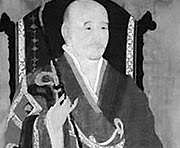Wǒnch'ǔk
Jump to navigation
Jump to search
| English Phonetics | Wǒnch'ǔk |
|---|
Dates
| Birth: | 613 |
|---|---|
| Death: | 695 |
Tibetan calendar dates
About
- Religious Affiliation
- Ximing tradition
Other Biographical info:
Links
- Treasury of Lives Link
- https://treasuryoflives.org/biographies/view/Woncheuk-%EC%9B%90%EC%B8%A1/13633
- Wiki Pages
Buddha Nature Project
- Person description or short bio
- Wǒnch'ǔk. (T. Wen tsheg; C. Yuance; J. Enjiki 圓測) (613-695). In Korean, "Consummate Keenness"; Silla-dynasty monk renowned for his expertise in Sanskrit and Yogācāra doctrine, who was influential in Chinese and in later Tibetan Buddhism. Wǒnch'ǔk is said to have left for Tang-dynasty China at the age of fifteen, where he studied the writings of Paramārtha and the She lun, or Mahāyānasaṃgraha, under Fachang (567–645). Wǒnch'ǔk later became the disciple of the Chinese pilgrim-translator Xuanzang who, in accordance with the new Yogācāra teachings of Dharmapāla that he had brought back from India (see Faxiang zong), denounced the existence of the ninth "immaculate consciousness" (amalavijñāna), which Paramārtha had advocated, and taught instead the innate impurity of the eighth "storehouse consciousness" (ālayavijñāna). These crucial doctrinal issues are said to have caused a split between the major disciples of Xuanzang: Wǒnch'ǔk and his followers came to be known as the Ximing tradition in honor of Wǒnch'ǔk's residence, Ximingsi, and was said to have been more open to positions associated with the earlier She lun zong; and the lineage of his fellow student and major rival Kuiji (632–682), which came to be known as the Ci'en tradition after Kuiji's monastery, Da Ci'ensi, and honed more rigidly to Xuanzang and Dharmapāla’s positions. Wǒnch'ǔk's famed Haesimmilgyǔng so (C. Jieshenmi jing shu), his commentary on Xuanzang's translation of the Saṃdhinirmocanasūtra, includes traces of Wǒnch'ǔk's earlier training in She lun zong thought and Paramārtha's expositions on the controversial notion of amalavijñāna. Wǒnch'ǔk regarded the amalavijñāna as simply another name for the inherent purity of the ālayavijñāna, but, unlike Xuanzang, he considered the ālayavijñāna to be essentially pure in nature. He also disagreed with Xuanzang's contention that the icchantika could not attain buddhahood. Hence, his work seems to be an attempt to reconcile the divergences between the old Yogācāra of Paramārtha and the new Yogācāra of Xuanzang. Wǒnch'ǔk's commentary to the Saṃdhinirmocanasūtra was extremely popular in the Chinese outpost of Dunhuang, where Chos grub (Ch. Facheng; c. 755–849) translated it into Tibetan during the reign of King Ral pa can (r. 815–838). Only nine of the ten rolls of the commentary are still extant in Chinese; the full text is available only in its Tibetan translation, which the Tibetans know as the "Great Chinese Commentary" (Rgya nag gi 'grel chen) even though it was written by a Korean. Five centuries later, the renowned Tibetan scholar Tsong kha pa drew liberally on Wǒnch'ǔk's text in his major work on scriptural Interpretation, Legs bshad snying po. Wǒnch'ǔk's views were decisive in Tibetan formulations of such issues as the hermeneutical stratagem of the three turnings of the wheel of the dharma (Dharmacakrapravartana), the nine types of consciousness (vijñāna), and the quality and nature of the ninth "immaculate" consciousness (amalavijñāna). Exegetical styles subsequently used in all the major sects of Tibetan Buddhism, with their use of elaborate sections and subsections, may also derive from Wǒnch'ǔk's commentary. Consequently, Wǒnch'ǔk remains better known and more influential in Tibet than in either China or Korea. Wǒnch'ǔk also wrote a eulogy to the Prajñāpāramitāhṛdayasūtra, and commentaries to the Renwang jing and Dharmapāla's *Vijñaptimātratāsiddhi, the latter of which is no longer extant. (Source: "Wǒnch'ǔk." In The Princeton Dictionary of Buddhism, 996–97. Princeton University Press, 2014. http://www.jstor.org/stable/j.ctt46n41q.27.)
Expand to see this person's philosophical positions on Buddha-nature.
| Is Buddha-nature considered definitive or provisional? | |
|---|---|
| Position: | |
| Notes: | |
| All beings have Buddha-nature | |
| Position: | |
| If "Qualified", explain: | |
| Notes: | |
| Which Wheel Turning | |
| Position: | |
| Notes: | |
| Yogācāra vs Madhyamaka | |
| Position: | |
| Notes: | |
| Zhentong vs Rangtong | |
| Position: | |
| Notes: | |
| Promotes how many vehicles? | |
| Position: | |
| Notes: | |
| Analytic vs Meditative Tradition | |
| Position: | |
| Notes: | |
| What is Buddha-nature? | |
| Position: | |
| Notes: | |
| Svātantrika (རང་རྒྱུད་) vs Prāsaṅgika (ཐལ་འགྱུར་པ་) | |
| Position: | |
| Notes: | |
| Causal nature of the vajrapāda | |
| Position: | |
